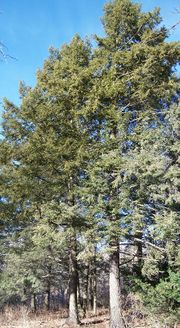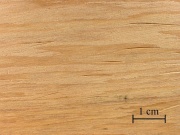Difference between revisions of "Eastern hemlock"
Jump to navigation
Jump to search
| Line 1: | Line 1: | ||
| − | File:Tsuga canadensis morton.jpg|thumb|Eastern Hemlock (''Tsuga canadensis''); Credit: Bruce Morton]] | + | [[File:Tsuga canadensis morton.jpg|thumb|Eastern Hemlock (''Tsuga canadensis''); Credit: Bruce Morton]] |
[[File:09_EasternHemlock.jpg|thumb|Eastern Hemlock (''Tsuga canadensis'')]] | [[File:09_EasternHemlock.jpg|thumb|Eastern Hemlock (''Tsuga canadensis'')]] | ||
Revision as of 10:23, 12 April 2020
Description
A hemlock tree, Tsuga canadensis, native to eastern North America, ranging from Alabama to New England and west to Wisconsin. The eastern hemlock has horizontal branches that droop to the ground. It is the state tree of Pennsylvania. The tree produces a strong lightweight wood that splinters easily. It is used for paper pulp, boxes, and crates. Tannins extracted from the bark are used to make leather.
See also Hemlock bark.
Synonyms and Related Terms
Tsuga canadensis; Tsuga mertensiana (19th c.); sapinette noire (Fr.); sapinette du Canada (Fr.); Canada hemlock; Canadian hemlock; American hemlock; hemlock spruce
| Density | 28 pcf |
|---|
Sources Checked for Data in Record
- G.S.Brady, Materials Handbook, McGraw-Hill Book Co., New York, 1971 Comment: p. 394
- Dictionary of Building Preservation, Ward Bucher, ed., John Wiley & Sons, Inc., New York City, 1996
- External source or communication Comment: Northern Hemlock and Hardwood Manufacturuers Association, Oshkosh, Wis.: air-dry weight = 28 pcf
- Encyclopedia Britannica, http://www.britannica.com Comment: "Hemlock." Encyclopædia Britannica. 18 Aug. 2004 .
- Gordon Hanlon, contributed information, 1998
- Random House, Webster's Encyclopedic Unabridged Dictionary of the English Language, Grammercy Book, New York, 1997

